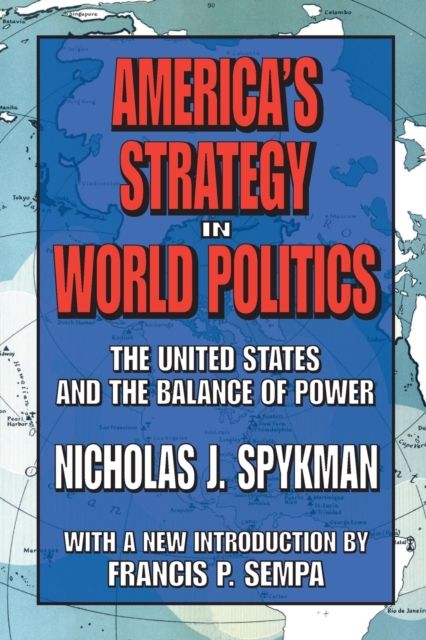America's Strategy in World Politics: The United States and the Balance of Power

America's Strategy in World Politics: The United States and the Balance of Power
Less than a year after the United States entered the Second World War, Nicholas Spykman wrote a book that placed the war effort in the broader context of the 1940s global balance of power. In America's Strategy in World Politics, Spykman examined world politics from a realist geopolitical perspective. The United States, he explained, was fighting for its very survival as an independent country because the conquests of Germany and Japan raised the specter of our geopolitical encirclement by hostile forces controlling the power centers of Europe, the Middle East, and East Asia. Spykman warned that the United States could not safely retreat to a defensive position in the Western Hemisphere.
Spykman looked beyond the immediate strategic requirements of the Second World War, envisioning a postwar world in which the United States would help shape the global balance of power to meet its security needs. Even though Soviet Russia was our wartime ally, Spykman recognized that a geopolitically unbalanced Soviet Union could threaten to upset the postwar balance of power and thereby endanger U.S. security. Spykman also foresaw the rise of China in postwar Asia, and the likely need for the United States to ally itself with Japan to balance China's power. He also recognized that the Middle East would play a pivotal role in the postwar world.
Spykman influenced American postwar statesmen and strategists. During the Cold War, the U.S. sought to deny the Soviet Union political control of Western Europe, the Middle East, and East Asia. Spykman's geopolitical vision of U.S. security, supported by a balanced Eurasian land mass, coupled with his focus on power as the governing force in international relations, makes America's Strategy in World Politics relevant to the twenty-first century.
PRP: 479.90 Lei
Acesta este Prețul Recomandat de Producător. Prețul de vânzare al produsului este afișat mai jos.
383.92Lei
383.92Lei
479.90 LeiLivrare in 2-4 saptamani
Descrierea produsului
Less than a year after the United States entered the Second World War, Nicholas Spykman wrote a book that placed the war effort in the broader context of the 1940s global balance of power. In America's Strategy in World Politics, Spykman examined world politics from a realist geopolitical perspective. The United States, he explained, was fighting for its very survival as an independent country because the conquests of Germany and Japan raised the specter of our geopolitical encirclement by hostile forces controlling the power centers of Europe, the Middle East, and East Asia. Spykman warned that the United States could not safely retreat to a defensive position in the Western Hemisphere.
Spykman looked beyond the immediate strategic requirements of the Second World War, envisioning a postwar world in which the United States would help shape the global balance of power to meet its security needs. Even though Soviet Russia was our wartime ally, Spykman recognized that a geopolitically unbalanced Soviet Union could threaten to upset the postwar balance of power and thereby endanger U.S. security. Spykman also foresaw the rise of China in postwar Asia, and the likely need for the United States to ally itself with Japan to balance China's power. He also recognized that the Middle East would play a pivotal role in the postwar world.
Spykman influenced American postwar statesmen and strategists. During the Cold War, the U.S. sought to deny the Soviet Union political control of Western Europe, the Middle East, and East Asia. Spykman's geopolitical vision of U.S. security, supported by a balanced Eurasian land mass, coupled with his focus on power as the governing force in international relations, makes America's Strategy in World Politics relevant to the twenty-first century.
Detaliile produsului









